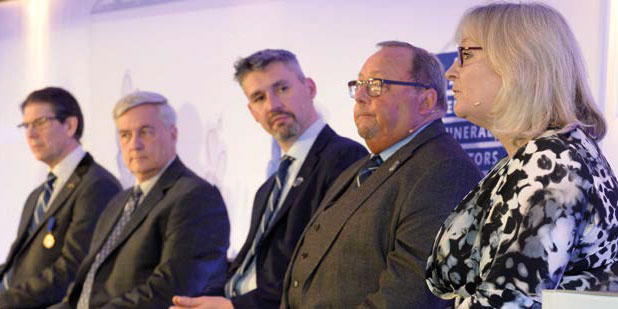AGM question time

A panel of experts answered members’ questions at the SAIF AGM in the spring. Here, SAIFInsight has collected the highlights.
The panel: Paul Allcock, Craig Caldwell, Declan Maguire, Joe Murren and Karen Trickett
Q. What do members facing the Financial Conduct Authority (FCA) need to do?
Karen Trickett, Golden Charter: “First of all, don’t panic. All of the providers are working very hard to get themselves ready and to support funeral directors.
“The two other specifics are: make sure that you’ve filled out your application with whichever provider you’re partnering with, and get really comfortable with the digital sales process and digital application forms that you’d fill in with a customer. The easiest way for all of us, whether plan providers or funeral directors, to be compliant will be using paperless digital platforms. They will do the heavy lifting: they’ll give you the scripts, the questions that you need to ask, and keep you as safe as possible.”
Q. Craig, we’re seeing the rise of unattended services and direct cremations in the UK. What can we learn from the US experience?
Craig Caldwell, The MazWell Group: “In the US we’ve been dealing with direct cremations since the mid- 1960s when it started down in Florida and on the west coast, and that has actually levelled off to some degree. In those particular states it’s primarily because they became retirement states: when the second half of a couple passes away there, they’re not going to spend the money because they don’t have a lot of friends in those areas so direct cremation is the option they select. In the areas of the country where family groups are more prevalent, there’s not a lot of direct cremation companies existing, they are in specific areas. In the larger cities you do have this as more of a common problem.
“You go into other countries and you don’t have direct cremation as much as you’re seeing here and in the US, partly because of cultural differences.
“I personally believe that as funeral directors we are the ones who have the opportunity to maintain cultures. If we really pay attention to the way we provide services to our families and listen to what our families actually want, we can maintain those cultures. In the US many funeral homes have been able to conquer direct cremation by talking through the whole process. You need to understand the families you serve.”
Q (asked by Grace Jevons, AOIC Vice-President): We’re very passionate about ritual, ceremony, honouring the dead and supporting bereaved families. We’re starting to work on projects to educate and inform people in our communities about choices in funerals. We’re working on face-to-face projects but with the big onus on digital, is face-to-face still valued? Can we expect support from SAIF with our educational projects?
Paul Allcock, SAIF Executive Committee member: “With direct cremation there is the opportunity to have a ceremony either with it or as a separate occasion, and I think it’s really important that those conversations are held with families.
“In terms of public awareness of what direct cremation actually is, I’m with you there. If there’s anything I or SAIF can do to help support you in that drive I would be delighted to do so.”
Q. What are the panel’s views on new technologies around disposals?
Joe Murren, SAIF Scotland: “Clearly we’re now seeing resomation being introduced in the UK as another form of having a funeral and disposing of the deceased.
“We’ll continually see these new developments evolve. We’ve seen a tremendous development for online funerals in crematoriums mainly because of the pandemic.
“As funeral directors we need to take that on board and see how it fits with our businesses.
“It’s about looking at the cultural experience of the family. Are they going to embrace it? We need to be open to these ideas, not closed down. We need to see how it can best meet our business needs and the families we serve.”
Tags: 2022, AGM, answers, Craig Caldwell, Declan Maguire, Joe Murren, Karen Trickett, panel, Paul Allcock, Q&A, questions, SAIF